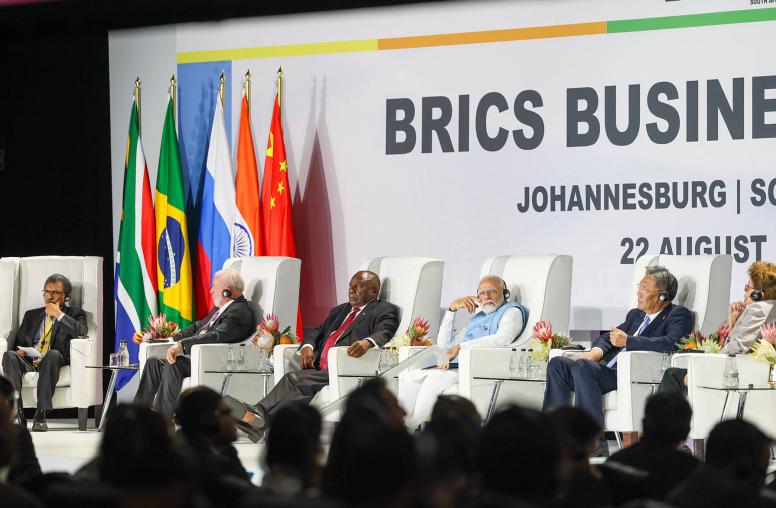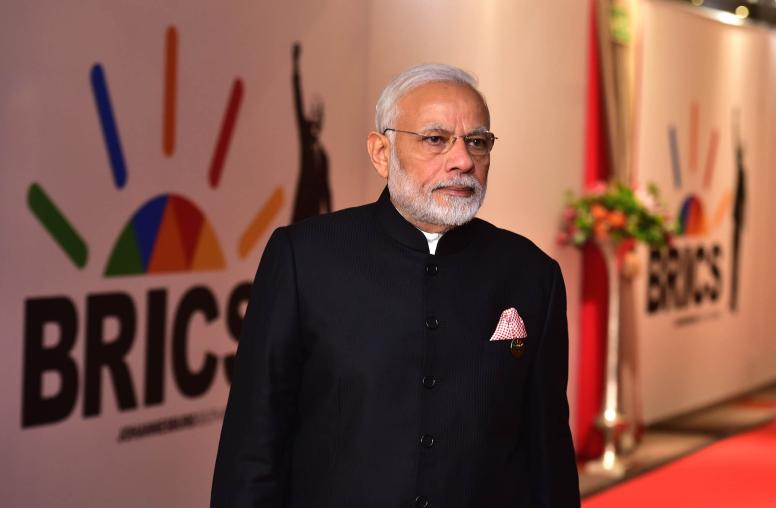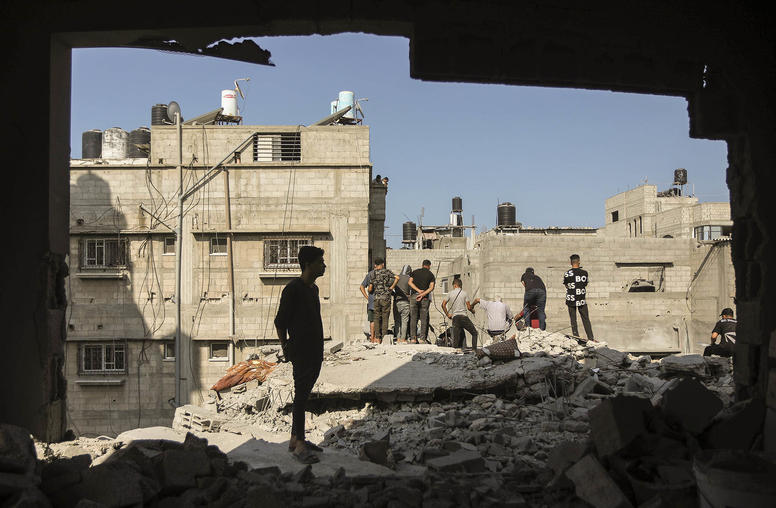Henry Tugendhat on the Geopolitical Impact of BRICS Expansion
The expansion of BRICS is a significant step in the bloc’s push to counterbalance the Western-led international order. But as a consensus-based group, “the question remains to what extent will they agree on what [that] alternative world order might look like,” says USIP’s Henry Tugendhat.
U.S. Institute of Peace experts discuss the latest foreign policy issues from around the world in On Peace, a brief weekly collaboration with SiriusXM's POTUS Channel 124.
Transcript
Laura Coates: Joined next by Henry Tugendhat, who is an economist with the China team at the United States Institute of Peace. He focuses on issues related to China's impact on conflict dynamics in Africa and Latin America. He joins us now, Henry, welcome, and good morning. How are you?
Henry Tugendghat: Hi good morning. Very well, thank you.
Laura Coates: I'm glad that you're here, thank you so much. Well, there was the BRICS summit in South Africa, it's an important group, Brazil, Russia, India, China and South Africa. Give our listeners a little bit of a rundown, though, of this group and what it's doing and what that summit was like as well.
Henry Tugendghat: Yes, absolutely, so, as you said, this is originally comprised of Brazil, Russia, India, China, South Africa, and this was a significant meeting, because they expanded the group's membership for the first time in the roughly 10 years that they've been running to include Argentina, Saudi Arabia, UAE, Ethiopia, Iran, and Egypt. And this is fundamentally a political grouping that was set up with a view that the one thing that reunited them was that the current world order favors Western interests and Western institutions and they wanted to try and create some sort of counterbalance to that. But of course, this is significant, because it now includes a lot of countries with whom the U.S. has difficult or even hostile relations, such as Iran, and as a as a forum of discussion that now forces us to consider some of the security interests, they may share among themselves, and how those may sometimes run counter to U.S. security interests.
Laura Coates: How do those run counter and obviously the combination Brazil, Russia, India, China, South Africa, I have to say it's an interesting combination of countries, number one, and I wonder, what are these common interests? And these, are they truly common economically? Is it through health? What is it? Is there a disdain for other countries that might include the U.S. obviously, all those do not have a nearly the relationship that we do with Russia, obviously, but what is the common ground for these countries?
Henry Tugendghat: Right, so that's a good question. We were not entirely sure yet, because one of the challenges that they have faced with this expansion is that, of course, this is going to lead to an expansion of voices. And I think, while a lot of analysis is focused on how China has tried to drive the expansion of this grouping, to say, counterbalance and institution like the G7. I think, really, what the risk ahead is that they've created, inadvertently, something a bit closer to the G20 in that they have now a much larger organization with no Secretariat, no legal authority over the decisions and often no consensus. So, I think it will, it’s unclear yet what the consensus will be because, of course, the geographic scope is global and the ability to create institutions within that will be challenging, but I think, you know, as a forum for discussion, it still matters, because obviously, this was created to have internal discussions among middle income countries without Western participants.
Laura Coates: Their membership is also significant in the scale because I understand with the new BRICS members, they represent almost half of the world's population, and a little over a third of its GDP at purchasing power parity, I mean, by contrast, the G7 comprises 10% of the world's population and a little less than a third of its GDP at purchasing power. That's very significant.
Henry Tugendghat: Yes, yes, it is and especially if you compare it with where they've come from. I mean, if you look at the year 2000, the G7 made up around 50%, just under, in purchasing power parity in the BRICS, as they were then just the original five, were a little less than 10%. So, in large part, this was really driven by China's success, its economic success. But it's obviously an economic grouping that is very significant in world stage now and will shape geopolitics. The question remains means, though to what extent will they agree on what those alternative institutions and an alternative world order might look like. And what we're seeing, we're already getting a sense of the challenges that they face just by looking at the last few years. I mean, Jair Bolsonaro in Brazil for four years, from 2019 to last year was a big critic of China's and picked many fights with them and similarly, since the 2020, border clash with India, China-India relations have been frosty, and that has hampered many of the alternatives to the current world order that they've been trying to implement, such as the New Development Bank, and which is trying to be effectively a Global South led version of the World Bank, but has yet to define itself against all of the other Global South alternatives to the World Bank that already exist.
Laura Coates: Do they have, I mean, they have any legal authority to decisions? I mean, is there like a secretariat, is there a big organizational notion here as compared to say a G7 and beyond?
Henry Tugendghat: No, there's no Secretariat, no legally binding decisions that don't necessarily come out of this. I mean, it's a very consensus-based grouping, but they do, I mean, they said they are trying to create institutions like New Development Bank and special reserve bank, which is supposed to be an alternative to the IMF. And the latter is struggling to get off the ground a bit more, but the New Development Bank is at least based in Shanghai and has some startup capital but is not yet as significant as many of the other Global South development banks like the Asian Development Bank, the Caribbean Development Bank, the Inter-American Development Bank, the African Development Bank, and so forth.
Laura Coates: Fascinating, so what is the next steps for this organization? What are we looking to see, what they do next and how is our own US government thinking about them?
Henry Tugendghat: So, I think we're going to be interested to see, effectively, what it means for these new members to join, Argentina, Saudi Arabia, UAE, Ethiopia, Iran, Egypt, you know what are the requirements on them joining? Are they going to have to inject capital into certain common projects and if so, what is the consensus around those projects? But otherwise, I think it'll just be a matter of what's on the agenda in the coming months. You know, what are they going to be talking about and what sort of decisions come out of these forums, to give us a sense of whether they're succeeding in their goal, or not?
Laura Coates: Really important to hear your perspective and to bring us all the information we need. Henry Tugendhat, thank you. An economist with the China team at the United States Institute of Peace. Thank you so much for joining us this morning.
Henry Tugendghat: Thanks so much for having me.


